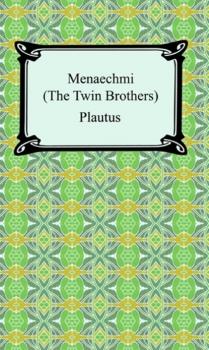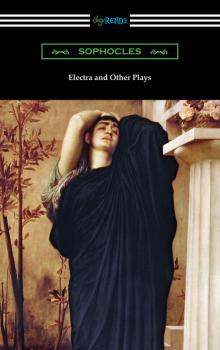Античная литература
Различные книги в жанре Античная литератураAias (Ajax)
The oldest surviving play of the great Greek tragedian Sophocles, «Aias» or «Ajax» unfolds the destiny of the warrior Aias after the Trojan War. He is infuriated with the Greek leaders for awarding the armor of Achilles to Odysseus, and he vows to kill them in his vengeance. When he attempts to seek his revenge, however, the goddess Athena interferes, leading him into disgrace. Determined to end his own life, Aias disregards the pleading of his wife and gives a stirring final speech before committing suicide. What follows is the question of his burial: does he deserve respect in death for leading an otherwise noble life?
As You Like It
"As You Like It", is one of William Shakespeare's most loved and often performed romantic comedies. «As You Like It» is the story of a Duke, who when unjustly deposed by his younger brother, Frederick, flees to the forest of Arden. The Duke's daughter, Rosalind, remains at the court until it is discovered that she has fallen in love with Orlando, the son of the Duke's friend. Rosalind flees with her cousin Celia in the guise of two young men to the forest of Arden so that she may pursue Orlando. There she meets a host of interesting characters and when her true identity is revealed love and happiness is finally achieved.
Menaechmi; Or, The Twin-Brothers
Considered to be Plautus's greatest play, «Menaechmi; Or, The Twin-Brothers» is the story of two twin brothers, Menaechmus and Sosicles, who are separated at age seven when their father takes Menaechmus on a business trip. This classic play, which provided the inspiration for Shakespeare's «Comedy of Errors», draws heavily on the theme of mistaken identity.
Electra and Other Plays
Only seven plays of the Ancient Greek dramatist Sophocles have survived to today. Sophocles is best known for his trilogy of dramas known as the “Three Theban Plays”, which is comprised of the plays “Oedipus Rex”, “Oedipus at Colonus”, and “Antigone”. The remaining four extant plays are collected together in this volume of “Electra and Other Plays”. First in this collection we find “Ajax”, the oldest of Sophocles plays which unfolds the destiny of the warrior Ajax after the Trojan War. Second there is “The Trachinian Maidens”, which gives an insightful account of the neglect that the wife of Hercules, Deianeira, and her family suffer as a result of her husband’s frequent and lengthy adventures. Thirdly we find the title drama, “Electra” which tells the classic tale of a young daughter’s revenge for her father’s death. Lastly in this collection there is, “Philoctetes”, which follows the life of a unique and important man through his trials and triumphs. In this volume the reader will find more evidence of why Sophocles is considered one of the greatest dramatists from classical antiquity. This edition follows the verse translations of Lewis Campbell and includes a biographical afterword.
Prometheus Bound and Other Plays
Often recognized as the father of tragedy, this collection of plays by the ancient Greek soldier and playwright Aeschylus is a testament to his skill and enduring legacy in the history of theatre. In «Suppliant Maidens,» the fifty daughters of Danaus flee from marriages to the fifty sons of their uncle, showing an obedience to their father that has tragic consequences. «The Persians», thought to be the oldest surviving play in the history of drama, focuses on the gory defeat of King Xerxes in his military expedition against the Greeks. The gods are punishing the hubris of the Persians to the point at which even the Greeks feel some sympathy for them. In «The Seven Against Thebes,» the battle for the throne of Thebes upon the banishment of Oedipus pits two brothers against each other in a fatal bout of single combat. Finally, «Prometheus Bound», whose authorship by Aeschylus has been questioned by dramatic scholars, explores the myth of a Titan and his punishment from Zeus for giving fire and knowledge to mankind. Though all of the plays differ widely in plot, the enduring quality of the characters and dialogue within these dramas are a testament to the considerable skill of Aeschylus. This edition follows the translations of E. D. A. Morshead.
The Bacchae
Euripides turned to playwriting at a young age, achieving his first victory in the Athens’ City Dionysia dramatic competitions in 441 BC. He would be awarded this honor three more times in his life, and once more posthumously. His plays are often ironic, pessimistic, and display radical rejection of classical decorum and rules. In 408 BC, Euripides left war-torn Athens for Macedonia, upon the invitation of King Archelaus, and there he spent his last years as a confidant of the king. In his final years, he produced “The Bacchae”, which in modern times has become one of the most frequently preformed plays from classical antiquity. Winner of the first prize of the Athens’ City Dionysia dramatic competition, the play is a tragedy based on the Greek myth of King Pentheus of Thebes and his mother Agave. When Dionysus appears at the palace of Thebes to attest that he is the son of Zeus, the sisters of his mortal mother, Semele, do not believe him. He proceeds to establish a cult of followers in Thebes and exact vengeance on all those who deny his godly status. Considered one of the greatest of all dramas from classical antiquity, this play’s popularity and critical acclaim stands as a testament to the profound dramatic talent of Euripides. This edition includes a biographical afterword.
The Two Gentleman of Verona
“The Two Gentlemen of Verona” is one of the Shakespeare’s classic romantic plays and considered by some scholars to possibly be the playwright’s first play. It is the story of two young gentlemen from Verona, Valentine and Proteus, who travel to Milan so that they may learn to be “perfect gentlemen”. Valentine is eager to begin this new adventure, but Proteus is reluctant to go as he has fallen in love with the beautiful Julia and she returns his devotion. However, Proteus’s father forces him to leave and he pledges his love to Julia before they part. In Milan, both Valentine and Proteus fall in love with the Duke’s daughter, Silvia, and Proteus is quick to forget Julia. She has not forgotten about Proteus and disguises herself as a boy so that she may follow him to Milan. Silvia does not return Proteus’s regard and has herself fallen in love with Valentine, though her father does not approve of the match. Much confusion and comical misadventures ensue before each of the gentlemen end up with the right lady and all misunderstandings are resolved. This enduring classic by the Bard is a tale of love, romance, happy endings, and the importance of friendship. This edition is annotated by Henry N. Hudson, includes an introduction by Charles Harold Herford, and a biographical afterword.
Troilus and Cressida
Although one of his lesser known plays, Shakespeare’s considerable abilities as a playwright are readily apparent in “Troilus and Cressida.” This historical and tragic ‘problem play’, thought to be inspired by Chaucer, Homer, and some of Shakespeare’s history-recording contemporaries, is initially a tale of a man and woman in love during the Trojan War. When Cressida is given to the Greeks in exchange for a prisoner of war, Troilus is determined to rescue her. When he does find her, however, Troilus believes Cressida has betrayed him. On a larger scale, this play also deals with the political battle being waged by Agamemnon of the Greeks against Priam of the Trojans. Much of the plot centers on war councils and battles in which Hector and Achilles play a part. Ultimately, Shakespeare’s play is memorable for its love and betrayal, questioning of hierarchy and honor, morality in the face of reality, and cynical disillusionment. This edition is annotated by Henry N. Hudson, includes an introduction by Charles Harold Herford, and a biographical afterword.
The Merry Wives of Windsor
One of Shakespeare’s early comedies, “The Merry Wives of Windsor” was first published in 1602 and is believed to have been written sometime before 1597. It is unique among his plays for its exclusive focus on the middle class of Elizabethan England, though it is nominally set during the reign of Henry IV. The main character is a fat knight, Sir John Falstaff, who first appeared in Shakespeare’s plays “Henry IV, Part I” and “Henry IV, Part II.” Falstaff tries to woo two married women for money, but they quickly discover his scheming and trick him numerous times in return, creating memorable, humorous scenes at Falstaff’s expense. An additional thread is woven into the story concerning the daughter of one of the wives, who loves a man of whom her parents do not approve. Most likely written at the personal request of Queen Elizabeth for a court occasion, this cast of strong female characters fills the stage with spirited action, not always without irony, and creates a plot overlaid with such timeless themes as marriage, cuckoldry, wealth, social class, and love. This edition is annotated by Henry N. Hudson, includes an introduction by Charles Harold Herford, and a biographical afterword.
Henry IV, Part II
The third part of Shakespeare’s impressive “Henriad”, this play follows “Richard II” and “Henry IV, Part I”, and precedes the final play of the tetralogy, “Henry V”. Following the events of “Henry IV, Part I”, Prince Hal is once again out of favor with his father, the king, who is in his last months of life. In contrast to their relationship in “Part I”, Falstaff, the comical criminal, is rejected by Prince Hal. Falstaff and Prince Hal only share two brief scenes together as Hal believes he must disassociate himself with the London criminal underworld before becoming king. A more somber play than “Part I”, King Henry IV lies in bed, sick, dying, and beset by constant rebellion. He feels the weight of his role and wonders if Hal is equal to the task, reflecting in the famous quote “Uneasy lies the head that wears a crown.” Falstaff too, in moments of cynical clarity, reflects on his own poor health and approaching death. A central theme is Hal’s reform into a man worthy enough to be king in contrast with Falstaff’s continued dissolute life. “Henry IV, Part II” is a work of transformation, reconciliation, and musings on life and death that attest to the universal nature of Shakespeare’s dramas. This edition is annotated by Henry N. Hudson, includes an introduction by Charles Harold Herford, and a biographical afterword.









